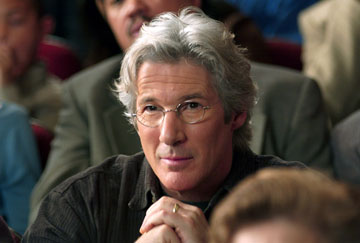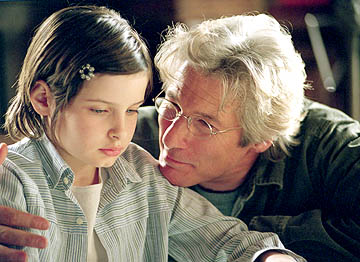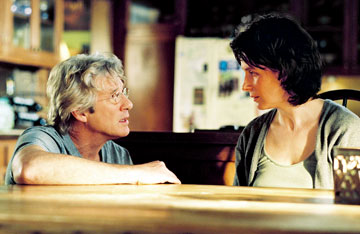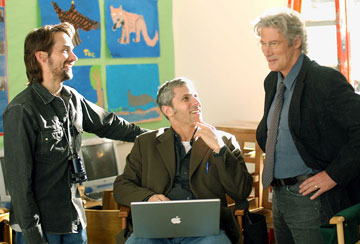

PopEntertainment.com > Feature
Interviews - Actors > Features Interviews
F to J > Richard Gere
 RICHARD
GERE
RICHARD
GERE
THE SEASON FOR GETTING
SPIRITUAL
by Brad Balfour
Copyright ©2005
PopEntertainment.com. All rights reserved.
Posted:
November
29, 2005.
Because Richard Gere has
spent years alternating between being a cinematic sex symbol (Chicago,
Pretty Woman) and Tibetan Buddhist devotee, he had a unique experience
to enhance his role as Saul Naumann, the college professor who encourages
his young daughter Eliza to both become a spelling bee champion and
Kaballistic acolyte in Bee Season – a complex and challenging film
about both family and spirituality.
It must've been a pleasure to work on such a spiritual movie.
The ideas were really
stimulating. It was mysterious and there was darkness. It's dangerous
territory to be playing in; we talked a lot about the responsibility of
doing this [story] in a serious, responsible way. Even inserting things in
the script, we said, "Look this is dangerous territory. This is nothing to
play with, because it isn't. This is serious stuff."
Kabbalah is very much in the media with celebrities like Madonna
sporting red bracelets and now this movie.
I don't know. I don't
have any friends who practice it so you would have a better idea than me.
I don't even think about it.
There are lots of bonds between Kabbalah and Buddhism, will you continue
to look into Kabbalah?
I'm perfectly fine with
Buddhism (laughs), but 'm particularly taken by this idea of Tikkun
Olam. I don't know if you know the magazine, Tikkun but its
founder Michael Lerner is someone I talked to quite a bit when I was
practicing this. And we were writing how to actually describe Tikkun Olam
and the origin of this concept, this idea of fixing of healing is an
important – I think – part of any genuine spiritual approach. But there is
a sense of… there is wholeness. In Buddhism, what we call Buddha Nature –
tathagatagarba – but in that sense it's not that is has to be fixed or
healed. It has to be revealed, it's been layered over – this sense of
oneness, the community of interconnectedness of experiential relationship
with emptiness – with Simhanada – of something that's just been clouded
over with ignorance and negative mindsets. You'd probably describe
Kabbalah better than I would and how it relates to something like that but
Kabbalah is very much about this idea of fixing of things that have been
damaged. From a Buddhist point of view, things have been damaged because
ignorance has intoxicated the mind. So there is a hardcore belief in a
self, and when you have a hardcore belief in a self you also have a
hardcore belief in the other self, and that creates separation, dualism,
and that's the source of all of our pain and suffering, it mushrooms from
there.
Besides going to synagogue what else did you do to immerse yourself in
Judaism?
I talked to a lot of
writers, rabbis, thinkers and spokespersons, some that I knew before and
some that I met during the process of making this film. In the book, this
character is really a cantor, and he's so hardcore Jewish. The decision
was made to make this a little more universal, so he's a religion
professor at Berkeley who specializes in Kabbalah, more specifically in
Abraham Abulafia – a 12th century Jewish mystic. But you can't become an
expert on anything in three or four months. What you can do is learn
enough to find how it stimulates sympathy with what you have learned in
your own life. I found certain aspects of this guy, Abulafia, and the
approach of Kabbalah were similar enough to my training in Tibetan
Buddhism, which is 30 years of practice, that it kind of hotwired into my
own truths of exploration in Buddhism.
 What
was the challenge of playing such a character?
What
was the challenge of playing such a character?
Oh, the challenges. It's
very easy to play certain characters in a caricature way, and I didn't
want this guy to be so obviously overbearing that you can just go, Oh
yeah, boy, this is a controlling motherfucker isn't he? [laughs]
and kind of write him off. I wanted to find a way that was subtle enough
that you could take a ride with him and give him the benefit of the doubt
for as long as possible. And realize that he also was caught up in his own
ignorance, like everyone else is, and at the same time is definitely a
controlling guy. There is a moment that's really important to me when he's
talking to his daughter and he's starting to give her the real stuff. He
trusts her enough and feels she's got it enough that he starts to give her
real teachings, and he pulls out the book of his translation work that
he's done on Abulafia. And he says to her that he thinks she really can
achieve "shiffa." I think the most honest he is in the whole movie is when
he says "I can't do it myself. I wanted to more than anything in the
world, my whole life was pointed in that direction but I can't do it. You
can." It's a really honest admission from a guy who turns on all the kids
that he teaches at university, and everyone thinks he's smart, he's got it
all, he's the real deal, but in the end he's an "academic." She
instinctively goes there, spontaneously.
What drew you to this character?
There are two things
I've got to be drawn by, basically the script when every piece of serious
work has a letter to the universe somehow. And the letter to the universe
from this was mysterious and all encompassing and generous and very much
about this yearning that I think we all have, that all beings have, to
reconnect, to fix but there is a larger universe, a less restricting one.
A less restricted universe?
That's all embracing,
that rejects nothing. The boundaries are pretty strict here in all ways. I
think you see that in children or start to. They get jumpy from feeling
minimized constantly, that all growing up is making them smaller, when the
instinct is to get larger, encompass the entire universe, which is
possible. You can expand your mind and your heart to the size of the
universe. You can expand your mind and heart at the speed of light, in all
directions. But everything in our culture and our basic ignorance that is
intoxicated it, has conspired to minimize the possibilities. So anyhow,
the yearning is for the larger self, not the smaller one, and that that is
the essential quality I found in this.
When he turns on his son Aaron [Max Minghella] for choosing his own
religious direction, he shows a hypocrisy that's natural in human beings.
I think what you say is
true, but it's more complex than that. Here's a son who lied to him about
what he was doing – now for good reason, because [the father] is a
controlling influence. If he had just told him the truth, he wasn't
guaranteed he was going to get the answer that he would have wanted. There
were a lot of lies… he got a call in the middle of all these problems with
his wife to find that his son has run away to be a Hare Krishna and has
been doing it for the last three months or whatever. So of course he got
angry.
You think he got angry because of his lying...
I said it was more
complex than one [thing] or the other. All these things are more complex
than one thing and that's part of the trick of doing
a movie like this. You can't let it ever be, "Oh, I get it. It's that."
It's like life; we're a myriad of conflicting forces—all of us. The
direction has to tell that; our storytelling has to tell it; the actors
have to be telling that too. Yeah it's "that", but also "that" and "that."
What was in the discussion?
I was moved by the movie
when I saw the early cuts. It was working on that level, I couldn't tell
you why, but when it got to the end of the movie and this little girl,
Eliza [Flora Cross] made the decision she made, I found it incredibly
moving. I couldn't tell you exactly why it was moving to me – not
consciously. It was a mysterious, spontaneous reaction to it. And if the
movie works for some people – and I'm sure there'll be people that it
doesn't work at all and just leaves them cold--it's because it taps into a
non-conceptual, emotional space that is generally, again, leading us into
that space of that yearning without telling us exactly what we're supposed
to feel. I don't think there's any music in this movie that gives you that
emotional cues that most movies do, "oh I'm supposed to be feeling this
here or, Oh! I'm supposed to be feeling that there." It's much more
complex playing, the same way Abulafia is a complex way of playing with
the structures of the mind to disorient from the known, and from the
habitual. That's one of the good things about this and probably one of the
reasons it won't be a hugely commercial movie. Even if it is successful,
it's never gonna be one of those type of movies. You got to be on the
wavelength with it. Some people are, some aren't. It's not good or bad,
it's just…you know, some people, you know, like an intense chocolate and
some people don't.
 You
certainly had some difficult moments with Juliette [Binoche] as his wife,
Miriam. That must have taken a lot of preparation?
You
certainly had some difficult moments with Juliette [Binoche] as his wife,
Miriam. That must have taken a lot of preparation?
Yes, Juliette is a
wonderful actress and I was so happy she was making this movie. We had
known each other for some time, but not well. A very difficult part to
play, it was all internalized. She...the way Juliette works is she's,
she's…in a way, she apologized to me, she said, "this is not going to be
easy for you." She's pretty much the character all the time. She immersed
herself in this character. She became remote to me. The relationship on
screen was more or less the relationship we had off. It was a bit
disconnected. You know, that's just the way it was.
Is that an advantage or a disadvantage in a movie this complex; but what
about working with the kids?
Well, Max [Minghella] is
not a newcomer. It's his first movie but he's hardly a newcomer. He was
born into the sea of movies and theatre; it's in his DNA most likely [his
father is Oscar-winning director Anthony Minghella]. And he's smart; you
know he's observant and self-critical. He knows when it's good and knows
when it's bad. He's monitoring himself… but he's always trying, he's
always working. He has a great natural sense of self-editing. His
bullshit-barometer is very acute, which is really important for an actor.
And Flora?
Flora… we were just
talking about this because the approach… I'm kind of instinctively doing
this because I've been doing this for so long, but design a performance. I
know what the shape of a performance needs to be; I know how to pull the
pieces out to do this on this day and this on another day. I can organize
it that way. Max is very much that way as well, he's instinctive yet it's
not yet become spontaneous with him. His mind will work that way. Flora is
day to day, it's like, "I come to play. I want to see what's required of
me." She works hard, she would have someone, the nigh before and the
morning of, go over her lines with her and she'd be prepared. It wasn't
like the design of a performance; I don't know if she ever understood what
was happening in the process. But she inhabited fully each day, and that's
a different approach. It means you have to have a really good director to
do that and you have trust the people you with.
So, working with these two directors, Scott McGhee and David Siegel…
Which was fine, and I
said both those counts as great. I loved working with those kids.
 How did you work with them?
How did you work with them?
They had a similar feel
to me of how to rehearse. Rehearsal, to me, is not about, "okay, let's get
the script out and make decisions about what we're going to do." That to
me leads to bad filmmaking. All of it is much more mysterious and creative
than that. And the most important thing is to feel confident, comfortable
and trusting. So just spending easy time together,you talk a little bit
about the script, maybe
read a few things. Not getting too heavy, not getting overly dramatic.
Just start to throw out things, look through magazines, talk about
wardrobe on each other, easy, light stuff. The creative process starts to
use that anyhow. And we start to move it in a certain direction.
How was that compromised by Juliette's standoffishness?
No, that's different.
It's not standoffishness about doing the work, it's that she felt it was
necessary not to be connected to me personally. Like, we wouldn't have
dinner afterwards. The process of the work was totally open, totally open.
Just to be cool about that.
How did you interact in terms of fixing your place in these things?
Well, you just do it. It
feels right or it doesn't. David Scott and I would talk, a lot, but
there's a certain point when you realize you're on a certain wavelength.
There's no point. You don't have to talk. Sometimes it would be, "Should
we got a little further?" Or, you know, "I'm gonna lay out in this scene.
I think we've done enough of that. I'm gonna just be moving in this scene,
I don't need to be focused on…just let me move through the frame." Those
were the kind of discussions we had.
Have you kept on your violin lessons?
Whew, one of the most
frustrating things I've ever done in my life. One of the joys of being an
actor is that you're always learning new things. And I've been doing this
since I was 19, so there's been a lot of new things I have learned for
each part. I always assumed that I can do it. I had this enormous hubris
that I could actually pull off playing the violin in three months[laughter].
I really had convinced myself it was possible and had wonderful teachers
and I worked really hard. And I was really horrible, and it was really
painful to the point where my family said, "Please stop." We went on
vacation and I dragged my violin with us, and they said, "You're ruining
our vacation, please stop."
Is this the first time you played a Jewish character?
I guess it is; actually
I just played another one. I cut all my hair off, but I had kind of a
Jew-Fro [laughs]. I had a perm, dark hair playing Clifford Irving –
I just finished that one, The Hoax. We just had a wonderful time
on this movie. Lasse Hallstöm directed it. And I'm doing a new one, The
Flock, with director Andrew Lau, who is – I don't know if you know his
work, Infernal Affairs – we’re starting shooting in just two weeks
in Albuquerque.